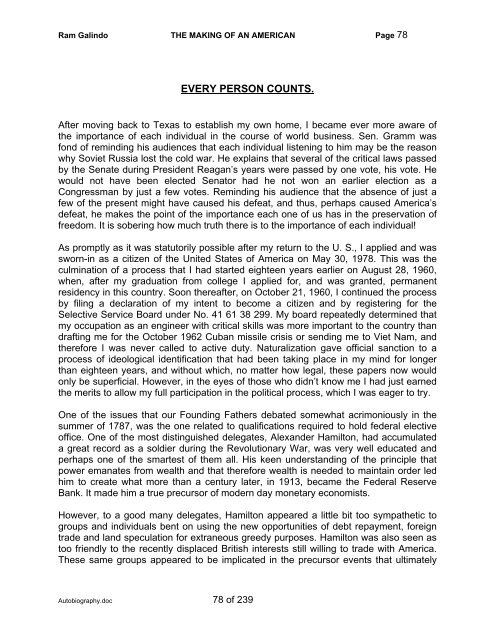Autobiography - The Galindo Group
Autobiography - The Galindo Group
Autobiography - The Galindo Group
You also want an ePaper? Increase the reach of your titles
YUMPU automatically turns print PDFs into web optimized ePapers that Google loves.
Ram <strong>Galindo</strong> THE MAKING OF AN AMERICAN Page 78<br />
EVERY PERSON COUNTS.<br />
After moving back to Texas to establish my own home, I became ever more aware of<br />
the importance of each individual in the course of world business. Sen. Gramm was<br />
fond of reminding his audiences that each individual listening to him may be the reason<br />
why Soviet Russia lost the cold war. He explains that several of the critical laws passed<br />
by the Senate during President Reagan’s years were passed by one vote, his vote. He<br />
would not have been elected Senator had he not won an earlier election as a<br />
Congressman by just a few votes. Reminding his audience that the absence of just a<br />
few of the present might have caused his defeat, and thus, perhaps caused America’s<br />
defeat, he makes the point of the importance each one of us has in the preservation of<br />
freedom. It is sobering how much truth there is to the importance of each individual!<br />
As promptly as it was statutorily possible after my return to the U. S., I applied and was<br />
sworn-in as a citizen of the United States of America on May 30, 1978. This was the<br />
culmination of a process that I had started eighteen years earlier on August 28, 1960,<br />
when, after my graduation from college I applied for, and was granted, permanent<br />
residency in this country. Soon thereafter, on October 21, 1960, I continued the process<br />
by filing a declaration of my intent to become a citizen and by registering for the<br />
Selective Service Board under No. 41 61 38 299. My board repeatedly determined that<br />
my occupation as an engineer with critical skills was more important to the country than<br />
drafting me for the October 1962 Cuban missile crisis or sending me to Viet Nam, and<br />
therefore I was never called to active duty. Naturalization gave official sanction to a<br />
process of ideological identification that had been taking place in my mind for longer<br />
than eighteen years, and without which, no matter how legal, these papers now would<br />
only be superficial. However, in the eyes of those who didn’t know me I had just earned<br />
the merits to allow my full participation in the political process, which I was eager to try.<br />
One of the issues that our Founding Fathers debated somewhat acrimoniously in the<br />
summer of 1787, was the one related to qualifications required to hold federal elective<br />
office. One of the most distinguished delegates, Alexander Hamilton, had accumulated<br />
a great record as a soldier during the Revolutionary War, was very well educated and<br />
perhaps one of the smartest of them all. His keen understanding of the principle that<br />
power emanates from wealth and that therefore wealth is needed to maintain order led<br />
him to create what more than a century later, in 1913, became the Federal Reserve<br />
Bank. It made him a true precursor of modern day monetary economists.<br />
However, to a good many delegates, Hamilton appeared a little bit too sympathetic to<br />
groups and individuals bent on using the new opportunities of debt repayment, foreign<br />
trade and land speculation for extraneous greedy purposes. Hamilton was also seen as<br />
too friendly to the recently displaced British interests still willing to trade with America.<br />
<strong>The</strong>se same groups appeared to be implicated in the precursor events that ultimately<br />
<strong>Autobiography</strong>.doc 78 of 239


